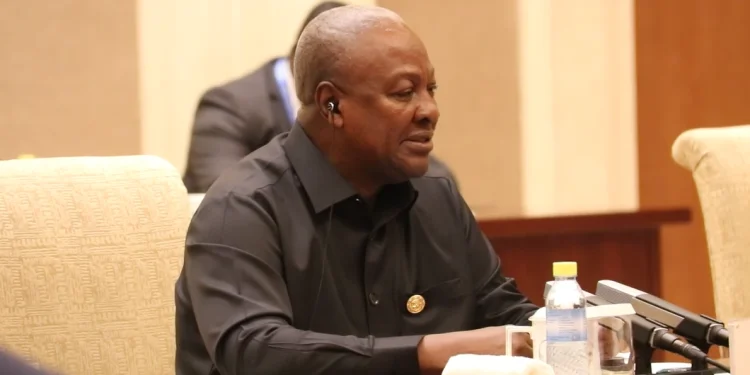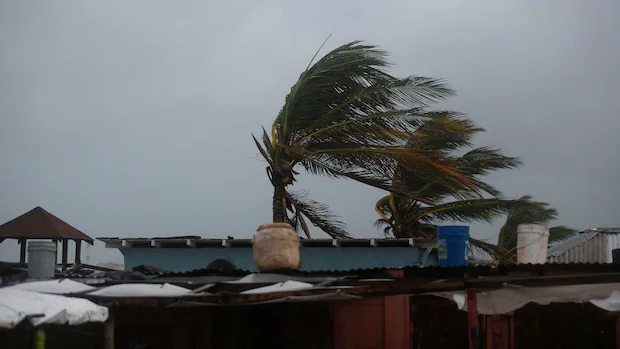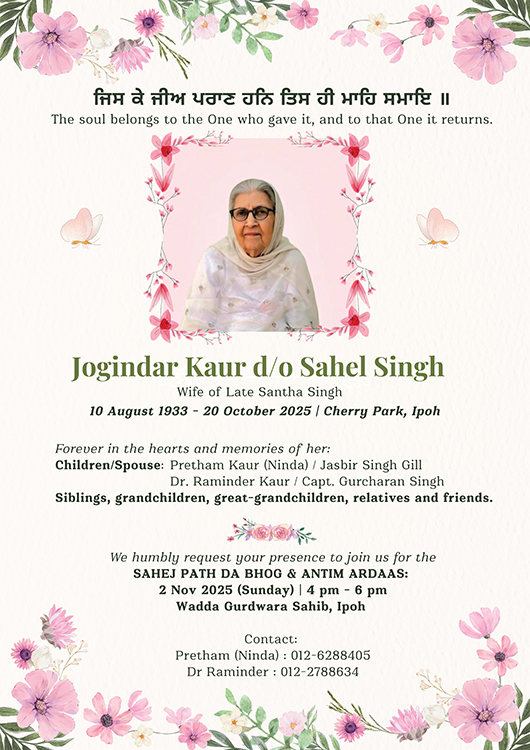Copyright vision1fm

Ghana’s President John Mahama concludes the interview with a wry remark, acknowledging the potential repercussions of his candidness. Several weeks earlier, Mahama’s Foreign Minister visited the U.S. State Department and encountered an op-ed authored by Mahama in The Guardian, a U.K. publication. In the article, Mahama sharply criticizes U.S. President Donald Trump’s unsubstantiated claims of white genocide in South Africa and characterizes his criticism of President Cyril Ramaphosa during a contentious Oval Office meeting as an affront to all Africans. “They inquired, ‘Did your President genuinely write this?” Mahama recounts to TIME in his presidential office located in Accra’s Jubilee House. “He responds, ‘Yes, my President is a writer and enjoys expressing his thoughts.’ Then they remarked, ‘Well, he is the President now. Could you request him to set his pen aside?’ Even if Mahama concedes and takes a break from writing, it is highly unlikely that he will ever cease to speak his mind candidly. On September 25, the 66-year-old delivered a speech at the U.N. General Assembly, accusing its Security Council of exercising “nearly totalitarian control over the rest of the globe,” while advocating for the inclusion of an African member in this elite body and the elimination of its veto power. “The future belongs to Africa!” he proclaimed to enthusiastic applause. A bit ostentatious, certainly—but far from mere rhetoric. By the year 2050, it is anticipated that over 25% of the global population will originate from the African continent, including one-third of individuals aged 15 to 24. Africa’s total GDP was $2.6 trillion in 2020 but is forecasted to soar to $29 trillion by 2050. Africa is home to three of the world’s 20 fastest-growing technology hubs, with Nigeria’s Lagos taking the lead. However, while the trajectory is undeniably clear, the journey is anything but smooth, as illustrated by Ghana’s recent experiences. The West African country, home to 34 million people, has often been regarded as a success story on the continent due to its democratic governance and economic stability. Nevertheless, Mahama was re-elected for a second non-consecutive term in January, amidst a severe economic crisis in his country, marked by a significant debt load, rising costs, and youth unemployment reaching an alarming 38.8%. In a mere six months, Mahama managed to restore stability, reducing inflation by half, strengthening the national cedi by 30%, and initiating a bold “Resetting Ghana” agenda. He introduced a 24-hour economy to enable businesses and public institutions to function continuously, eliminated burdensome taxes on online purchases and betting winnings, and implemented a code of conduct for all government officials to combat corruption. He committed to abolishing fees for all first-year students in public tertiary institutions and providing free feminine hygiene products to school-age girls across the nation. To address unemployment, he announced plans to train one million coders over four years, supplying the necessary talent to support a burgeoning tech industry. “We must enhance security to ensure that the streets are safe for individuals to commute to work and return home,” Mahama states. “Thus, we are aware of our responsibilities.” However, politics often involves dealing with the unexpected, and a significant challenge was on the horizon from the Pacific. Less than three weeks following Mahama’s inauguration on January 7, the Trump Administration began to significantly reduce USAID funding, which had previously allocated $12.7 billion to sub-Saharan Africa, representing 0.6% of the region’s GDP. According to the Institute of Security Studies located in Pretoria, the reduction in aid could result in an additional 5.7 million Africans falling into extreme poverty by the following year. Simultaneously, the Africa Centre for Disease Control and Prevention estimates that between two to four million more Africans may die each year due to the decrease in global aid budgets. In South Africa specifically, cuts to HIV/AIDS programs could lead to an extra 500,000 deaths over the next ten years, as reported by the Desmond Tutu HIV Center. Ghana has lost $156 million that was designated for HIV and AIDS control, malaria combat, as well as for research, governance, and education initiatives. Nevertheless, Mahama states that the cuts were “not fatal.” He remarked, “All I did was to instruct our Finance Minister to make adjustments … so we have accommodated it within our budget. We’re fine, but that is not the case for some other countries. I was in conversation with one of my fellow presidents, and the withdrawal of USAID has led to the shutdown of their school feeding program. For countries like that, the impact will be quite significant.” Consequently, Mahama’s presidency aligns with a new paradigm for Africa. Despite the continent’s abundant agricultural and mineral resources, it continues to grapple with limited access to global markets, inequitable trading conditions, and insufficient investment. These obstacles impede economic development, sustain poverty, and hinder many Africans from achieving their full potential. The aspiration is that, equipped with new technology, the decline in foreign aid will act as a rallying point that encourages African nations to carve out their own destinies, liberated from the shackles of aid dependency and external policy influences. While challenges remain, there are already indications that entrenched extravagance is being supplanted by a newfound sense of self-sufficiency. “Ghana will manage,” Mahama asserts. “And it teaches us to be self-reliant.” Mahama speaks with a calm and relaxed demeanor that contrasts with the straightforwardness of his statements—a suitable representative for a new chapter of African self-assurance. He was born in the quaint town of Damongo in the picturesque northwest of Ghana. His father was a well-known rice farmer and a local Member of Parliament under Ghana’s inaugural post-colonial leader, Kwame Nkrumah. After earning a degree in history from the University of Ghana, Mahama taught at a secondary school before seeking a post-graduate degree in social psychology in Moscow, where he graduated in 1988. His experiences during the decline of the Soviet Union reinforced the belief that each nation must carve out its own unique path, separate from generic ideologies. Upon his return to Ghana, Mahama was employed by the Japanese Embassy and the Plan International NGO before he ran for parliament in 1996. Mahama’s initial term as president, spanning from 2012 to 2017, could be characterized as lackluster. The country faced a significant power crisis and numerous corruption allegations, including the disclosure that Mahama accepted a Ford Expedition worth $100,000 from a contractor while he was vice president. (A later investigation exonerated Mahama of corruption, although it determined that the gift violated regulations and the vehicle was returned.) The GDP fell from 9.3% at the start of Mahama’s term to a low of 2.1% in 2015. By 2017, economic growth had rebounded to 8.1%, but by that time, voters had decided against granting Mahama a second term. However, his successor performed even worse, leading Ghana into an economic crisis due to poor fiscal management, insufficient economic diversification, and excessive public debt resulting from unsustainable borrowing and spending. In 2022, Ghana—the sixth-largest gold producer in the world and the second-largest cocoa exporter—defaulted on its domestic and international debt obligations. Mahama has quickly managed to stabilize the situation—his success is particularly noteworthy given the context of reduced aid. The issues surrounding the aid culture are well-established. Although aid provided immediate financial resources, only a small percentage actually benefited African stakeholders. USAID made significant efforts to allocate a quarter of its budget to local organizations. Nevertheless, the highest percentage they ever reached was approximately 10%, and last year, this figure even declined. “Western consulting firms, contractors, think tanks, and NGOs received a substantial portion of the funds intended for Africa,” states Bright Simons, the head of research at the IMANI Centre for Policy and Education, a think tank based in Accra. “Consequently, Africans were unable to develop their capacity with these funds.” In robust economies, citizens contribute income taxes in exchange for public services. Numerous studies have demonstrated how foreign aid disrupts this dynamic, causing governments to be more accountable to donors than to their own constituents, who, having been spared the burden of taxes, are less inclined to hold officials responsible. At the same time, the easy availability of funds undermines professionalism and encourages corruption. Each year, approximately $88.6 billion—around 3.7% of Africa’s GDP—leaves the continent as illicit capital flight, according to data from the U.N. “Aid fosters complacency among African policymakers,” asserts Baroness Dambisa Moyo, a Zambian economist, in her book Dead Aid: Why Aid is Not Working and How There is Another Way for Africa. “This may partly account for the prevailing sense of indifference and lack of urgency among many African leaders in addressing the continent’s pressing issues.” The criticism has gained widespread acceptance. Zambia’s President Hakainde Hichilema referred to the USAID cuts as a “long overdue” wake-up call, while his Rwandan counterpart, Paul Kagame, expressed that the continent cannot “depend on the generosity of others indefinitely,” adding: “I believe that from experiencing pain, we may acquire some insights.” Although Mahama mourns the abrupt removal of the aid Band-Aid, he asserts that the ultimate outcome will be beneficial—even if it entails difficult lessons for Africa concerning U.S. priorities in this evolving global landscape. In addition to the withdrawal of aid, the Trump Administration has increased tariffs across Africa, including a 15% tariff on Ghanaian exports. Mahama’s frustration is evident. “One nation cannot declare, ‘I wish to isolate myself, so I will impose tariffs on you to revive manufacturing,'” Mahama states. “These tariff negotiations required many years under the WTO to finalize, and for one individual to begin imposing tariffs on everyone is unreasonable.” Mahama trails off in frustration. “I do not believe this is an effective method of executing foreign policy.” The implications of the aid reductions and tariff increases for America’s international reputation remain uncertain. After all, USAID was established by President John F. Kennedy through executive order in 1961 during the peak of the Cold War, specifically to counteract Soviet influence abroad. Currently, the U.S. finds itself in a new phase of Great Power rivalry with China, whose influence is expanding globally, particularly in resource-abundant Africa. Mahama asserts that the Trump administration’s nativist shift “diminishes U.S. soft power and allows [Africa] to be more accessible to other actors.” It is not solely superpowers that are vying for a share of the opportunities available. Gulf nations, India, and Europe are all aiming to capitalize on this potential. In August, London Mayor Sadiq Khan undertook the first-ever African trade mission by someone in his position, visiting Ghana, Nigeria, and South Africa. He remarked to TIME in Accra, “At a time when President Trump is attacking international students, we in the U.K. should be encouraging talented international students to come to our British universities.” Nevertheless, the U.S. maintains that it is not withdrawing, with the State Department emphasizing the presence of over 100 American companies operating in Ghana across various sectors, including oil and gas, healthcare, small modular nuclear reactors, and mining. On July 24, Google inaugurated its Artificial Intelligence Community Center in Accra, accompanied by a $37 million investment in research and innovation in Africa. Rolf Olson, Chargé d’Affaires ad interim at the U.S. Embassy in Accra, asserts to TIME that Washington is “prepared to collaborate with President Mahama and his administration in addressing illegal and corrupt activities” such as illegal gold mining, which he claims “has been fueled by foreign entities, including Chinese firms and nationals.” However, this confrontational stance is not echoed by Mahama, who states that “the Chinese government has been supportive” of law enforcement initiatives. “I prefer not to concentrate solely on China.” The fact that Washington appears to be significantly focused on Beijing makes the new U.S. approach “unexpected,” according to Mahama. “I can comprehend U.S. anxiety regarding China… but that is precisely when you require your allies. That is when you need Canada, that is when you need Mexico, that is when you need the E.U. However, if you are imposing threats on the E.U. and others with 50% tariff hikes, and on South American nations with 100% tariff hikes, the objective of this entire policy becomes unclear. Cooperation would have been preferable to the existing global tensions. Washington’s attempts to portray China as the antagonist are weakened by the prevailing view that American involvement is now driven by interests rather than principles. Nevertheless, despite China’s increasing overseas investments, particularly through its $1 trillion Belt and Road Initiative—a global trade and infrastructure network—it is unlikely that China will (or even desires to) completely supplant the United States. While Beijing concentrates on developing ports, pipelines, and railways, the kind of capacity-building engagement that has traditionally defined USAID’s approach is absent from its strategy. China is not inclined to finance initiatives that promote gender equity, affirmative action, the training of impartial judges, or enhancements in regulatory performance within African nations, as these are not values upheld by its government domestically. Although self-reliance is the objective for Africa, the challenge lies in attaining genuine autonomy without the structural transformation of nations that continue to be highly unproductive. Every nation worldwide that has successfully undergone structural transformation—from the Asian Tigers to the Balkans—has depended on substantial infusions of foreign capital. Given that the current situation in sub-Saharan Africa is so inadequate—characterized by poor education, healthcare, security, and more—these issues often consume domestic resources. As a result, the majority of future-oriented projects are financed by donor agencies: green transitions, the integration of AI, youth leadership, and media literacy. In Ghana, for example, USAID was a significant investor in eco-tourism—drawing foreign visitors to natural sites to create alternative livelihoods, thereby encouraging people to shift away from illegal mining. “Thus, even though the total amount of aid is relatively small, its removal creates a substantial void in that future-oriented segment of the country’s structural transformation,” states Simons of IMANI. “The future often does not seem urgent because we are so preoccupied with the present. However, the present cannot lead us anywhere.” The challenge lies in how to infuse capital without succumbing to the dangers of aid dependency. With commodity prices reaching unprecedented levels, Africa’s natural resource wealth is among the primary sectors attracting attention. Moreover, liberated from the client-benefactor dynamic that aid fosters, African nations are demanding local processing and refining to secure a greater share of the downstream advantages. “One thing we must move away from is this paternalistic mindset,” Khan states. “The ‘helping hand’ approach is more effective, as it enables individuals to engage in trade.” For many years, the generosity of Western nations placed their African counterparts in a difficult situation, where they were compelled to “play polite” while their resource sovereignty was compromised, according to Marcus Courage, CEO of Africa Practice, a business consultancy. “Currently, African governments have acknowledged that they possess greater autonomy and must leverage it to enhance self-reliance and attain true financial sovereignty.” Guinea, recognized as the leading bauxite exporter globally, has initiated requirements for foreign mining companies to invest in local alumina refineries to augment value. Companies that fail to comply, such as Emirates Global Aluminium, have faced license revocations. In Ghana, the country’s inaugural commercial gold refinery commenced operations in August 2024, and Mahama introduced a new regulatory body, GoldBod, to combat smuggling and increase state revenues. Consequently, gold exports have surged by 75% year-on-year. “This signifies that Ghana is able to derive more benefits from its gold resources,” Mahama remarks. Technology can also assist Africa in realizing its concealed potential. The continent possesses 60% of the world’s uncultivated arable land, which has the capacity to sequester substantial amounts of carbon—yet it accounts for only 16% of the global carbon credits market. This creates an unexploited opportunity for African nations to capitalize on their mature forests and pristine wetlands, which are especially valued for carbon capture. There are also numerous opportunities to sell credits for transitioning from fossil fuel stoves—approximately 80% of sub-Saharan Africans rely on wood or charcoal for cooking—to solar or biomass. Thus far, Kenya, Gabon, and Tanzania have taken the lead, while countries like Ghana, Uganda, and Zambia are striving to catch up. The Congo Basin rainforest, for instance, extracts carbon from the atmosphere with an estimated value of $55 billion annually, according to the Center for Global Development (CGD), which is equivalent to 36% of the GDP of the six nations that host the forest. “This asset can and should be regarded as comparable to mineral or oil deposits that provide significant advantages for the countries that possess them,” asserts the CGD in a 2022 report. Ghana has 288 forest reserves, of which 44 have been encroached upon by illegal gold miners. “We’ve managed to reclaim nine of them,” states Mahama. “And we have initiated a program to begin the reclamation of those forest reserves to restore them.” However, it is not solely about carbon. While the world admires Africa’s natural resources, challenges arise in their utilization—pollution, corruption, human rights violations, and criminal infiltration. But what if there were a method to leverage these resources while keeping them undisturbed? The global tokenization of illiquid assets—ranging from vintage paintings or vinyl records to collectors’ cards or real estate—is projected to evolve into a $16 trillion business opportunity by 2030, according to the Boston Consulting Group. There is an increasing demand to utilize blockchain technology to tokenize commodities such as Ghana’s gold reserves, Botswana’s diamond reserves, and Zimbabwe’s platinum. While more effective monetization of natural resources could provide a significant boost, the key lies in utilizing that financial gain to diversify the economy beyond extractive sectors—ensuring economic resilience for when commodity prices decline. Mahama envisions Ghana transitioning from mining and agriculture to processing and agribusiness, which includes sectors such as food and beverages, refined vegetable cooking oils, and similar industries. “We are exploring digital services, fintech, textiles, and manufacturing,” he states. For Mahama, Africa should not merely aim to export to developed countries but should focus on intra-African trade. He references the establishment of the African Continental Free Trade Area in 2018—the largest free-trade area globally, encompassing a $3 trillion market—as a largely untapped opportunity. In July, Narendra Modi visited Accra, marking the first visit by an Indian Prime Minister in thirty years, and Mahama notes that the two leaders discussed technology sharing to enhance Ghana’s emerging pharmaceutical industry. “Currently, we export [pharmaceuticals] in limited quantities to our West African neighbors,” Mahama explains. “However, the African Continental Free Trade Area allows us to expand our reach from a market of 34 million to one of 1.3 billion.” Naturally, realizing this potential necessitates investment. Although the reduction of unrestricted aid may ultimately be advantageous in the long run, the absence of alternative financing remains a challenge. While self-funding is the ultimate objective, the journey will be lengthy. Collectively, African nations have only 20 sovereign wealth funds with a total capitalization of $97.3 billion—representing less than 1% of the global total. Additionally, many African countries incur interest rates on their debt that are four times higher than those of high-income nations, despite often having lower debt-to-GDP ratios. Consequently, an average African government allocates 18% of its total revenue to interest payments alone, according to the Tony Blair Institute for Global Change (TBI), in contrast to just 3% for E.U. countries. The TBI has introduced a new cost-effective $100 billion debt-swap facility, which will be managed by multilateral development banks, aimed at consolidating and refinancing current liabilities at concessional rates. For instance, Kenya is currently servicing an international loan of $1.5 billion with an interest rate of 9.5%. By refinancing at a rate of 3%, the country could save $97.5 million each year. Indeed, $97.5 million represents a significant sum that could be allocated to support schools, hospitals, and essential infrastructure projects. However, this amount is still less than half of the $225 million that Kenya was expected to receive from USAID, with half of that amount earmarked for healthcare expenditures. The U.S. is not alone in reducing aid; the U.K. is also decreasing its aid budget from 0.7% of GDP before the pandemic to 0.3% by 2027. Nevertheless, the way USAID was fragmented, coupled with high tariffs, leaves a bitter impression on Mahama. “Since the conclusion of the Second World War, we have experienced a world characterized by greater interdependence and a multilateral approach to international relations,” he states. “However, the current trend appears to be shifting towards unilateralism. This shift is detrimental to all, as global progress relies on collective advancement.” Share this: Click to share on Facebook (Opens in new window) Facebook Click to share on X (Opens in new window) Like this:Like Loading...



